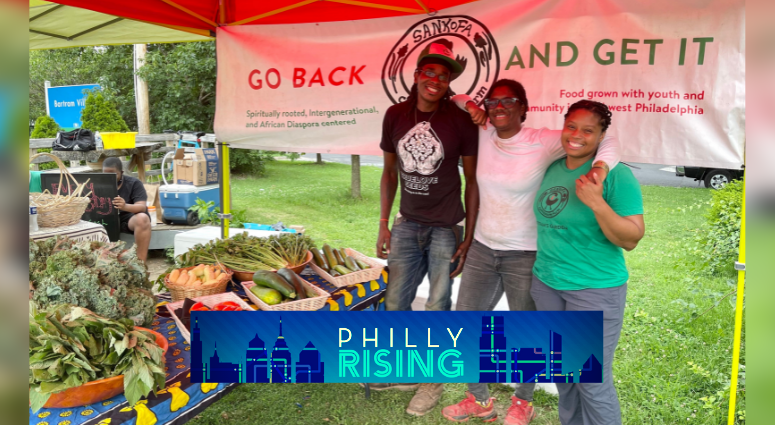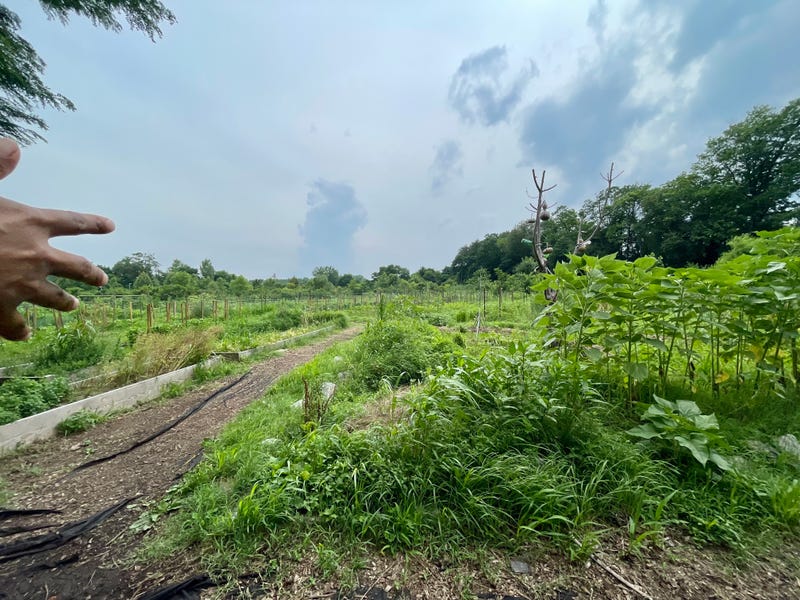
PHILADELPHIA (KYW Newsradio) — The weekly farmer's market, near the corner of 54th Street and Lindbergh Boulevard in Southwest Philly's Kingsessing neighborhood, is special for a few reasons.
They sell food grown just around the corner in the Sankofa Community Farm, in Bartram’s Garden. But the work Sankofa does is less about growing and selling produce than it is about maintaining and honoring the land and its connection to the legacy of the African diaspora.

Both the market and its location are unique for the city.
"We are specifically blessed, for our farmers to be literally right here in the space of Bartram's Village, located in Bartam's Garden, because it is the largest public housing campus in the county of Philadelphia," said Chris Bolden-Newsome, co-director and cultural educator for the Sankofa Community Garden.
"And so we have ready access to folks who want the food, who need the food, and for whom the food is traditional, for whom the food is ancestral."
Everything starts with a song and prayer, whether it's planting seeds, tending crops, or opening up the market stand in the afternoon to sell them.
"Sankofa is a truncated version of a phrase which means 'Go back and get it, ain’t nothing wrong with going back and getting what you left behind' — literally," Bolden-Newsome said. "We recognize that our people are complex, and so we try to approach it with the only tools that we have, which are our deep African American spirituality."
Volunteers maintain the two-acre facility using only practices of natural agriculture, grounded in spiritual, ancestral and sustainable awareness.
"Single-cropping and mono-cropping is what they practice on industrialized farms to help increase the yield. They’re using chemicals and pesticides. But multi-crop farming actually is more beneficial for the soil," said Ashley Gripper, an assistant farmer and volunteer coordinator.
"For the organisms within the soil, it helps with soil health. And it’s actually a practice that is indigenous to Africa. So this is something that our ancestors have always practiced."
The group says the work on the farm is about much more than growing or selling the food. Gripper started volunteering at the farm when her father died this past year, and she says the land is what helped her through the grieving process.
"When you do this work, and you pour your sweat and your tears and your love into the soil, the soil literally rewards you and gifts you with food. It gifts us with everything that we need,” said Gripper. "That’s part of the work that I believe I’m charged to do, is to help reconnect people with the land in that way and help us to heal our relationships with the land and heal our relationships with each other through the land."
Laquanda Dobson teaches families how to make cook with the plants they sell.
"My responsibility as a farmer and a chef is to make sure that the younger generation knows all of these things without having to recreate the wheel. I think there’s a lot of people who are lost and still don’t know their heritage foods, or they’re just not trying to eat it," Dobson said. "So it is definitely my heart's pull to make sure that people of African descent are eating our black-eyed peas, our okra, our callaloo, and eating all of the hot peppers that connect us to our ancestors."
Bolden-Newsome calls the efforts "rematriation," a word they use in place of "repatriation," which means to restore or return to the country of origin.
"Our people need it for their healing. We’re rematriating, because we’re bringing people back to their motherland," Bolden-Newsome said.
"It’s very important for us in the work, is that we focus on the African diaspora, which means that we don’t skip 400 years of our story — of joy, victory and suffering and trauma — in order to go all the way back to Africa."
Bolden-Newsome acknowledges that African Americans' relationship with land and farming is complex, considering 400 years of slavery.
"We try to honor and recognize the complexity of Black people’s story in Philadelphia. This may be their food. This may be a way of life that even their grandmothers were accustomed to. But it’s fraught with all kinds of stories of trauma around separation, intentional and unintentional."
Sankofa plants seeds not only to grow food but also to grow future Black generations.
"You will have to spend some time with us on the land to really understand the weight of what we hold and the knowledge that we hold. We are not just holding the knowledge, though. We are making sure that everyone knows our market is a teaching market," Dobson said.
"Thinking about those practices, and the fact that our ancestors shared those practices with the world, reminds me that my people have always done this. My people will continue to do this. And our responsibility, beyond sustainability, is like our responsibility to Earth, to the land, to care for her," said Gripper.
